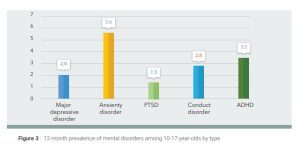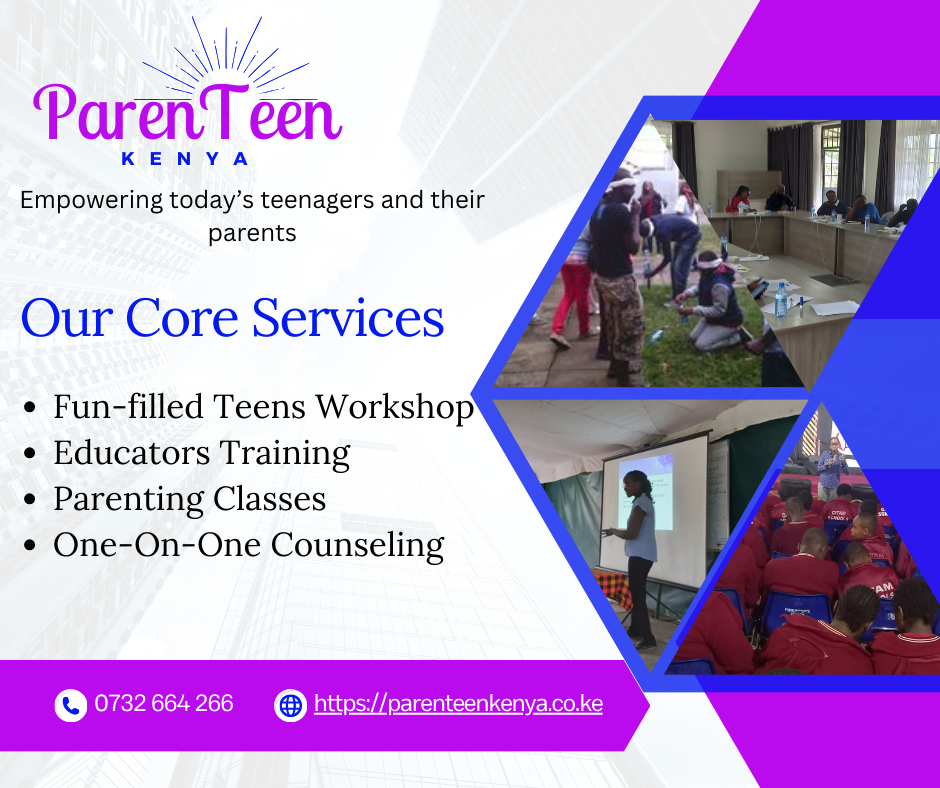Most adolescents in Kenya cannot function at a high level in problem-solving, collaboration, and self-awareness skills. This finding is from a recent research by Regional Education Learning Initiative (Reli) and was highlighted on Nation Africa.
In addition, a third of teenagers in Kenya struggle to identify problems in their life and look for possible solutions.
And, only 5% of the 13–17years olds could be considered proficient at problem-solving. In that, they could justify their chosen solutions and identify several approaches to solving a problem.
Any parent of a teenager reading these statistics may be worried and would want to understand why this is happening. Most would wonder if their teenager is among those struggling with problem-solving.
To assist the Kenyan parent with answers to these questions, ParenTeen Kenya will discuss four common reasons Kenyan Teenagers cannot deal with life problems. We will also outline the possible solutions you can use. Let’s get to it.
Conditioned to Memorize and Retrieve

For the longest time, the Kenyan education system has programmed students to read for exams. The students are expected to memorize facts, formulas, and concepts without necessarily understanding their practical applications.
The soon-ending 8-4-4 system approach prioritizes test scores and grades over cultivating the ability to analyze problems, think critically, and develop creative solutions.
As a result, current teenagers have become good at regurgitating information but struggle when faced with real-life challenges that require problem-solving skills.
Your teenager then approaches learning as a process of memorization and recall rather than a means to develop critical thinking and problem-solving abilities.
Solution for Parents
As a parent of a teenager in this age group, you need to play an active role in helping your teenager see the world as a place with multiple ways of addressing life challenges. Use the following approaches at home:
- Engage your teenager in puzzles, brainteasers, riddles, and logic games that require critical thinking and problem-solving.
- Encourage your teenager to think critically by engaging in discussions about current events, books, or movies.
- Provide opportunities in your home for your teenager to apply problem-solving skills in real-life situations.
- Encourage your teenager to pursue their interests, try new activities, and explore different perspectives.
- Encourage your teenager to work on collaborative projects with their peers or family members. For example, making a shoe rack or pet house, starting a business, or creating art.
[Related: Why High School Violence in Kenya Has Increased]
Instant Gratification Culture
“I want it now and not later” is the unspoken language Kenyan teenagers live by nowadays. Undoubtedly, this method of approaching life has been fueled by technology and social media.
The availability of instant feedback, quick solutions, and immediate rewards through digital platforms like Tik Tok, Instagram, and Google has shaped your teenager’s expectations and behaviors.
Consequently, your teenager struggles with the patience and perseverance required for complex problem-solving. They have grown accustomed to rapid responses to their queries and instant access to information.
Additionally, social media highlight reels (short video clips) and polished content by celebrities or their friends cause them to desire instant results.
When your teenager watches a carefully created video of a successful influencer, they automatically perceive success as effortless and immediate.
Afterward, they may have unrealistic expectations devoid of the challenges, setbacks, and repetitive nature of problem-solving.
Solution for Parents
To counter the impact of instant gratification culture, your home should be a place that encourages delayed gratification and perseverance.
For example, give them tasks that require patience and ensure the reward comes after several days or weeks.
Secondly, instead of dwelling so much on how they have failed, emphasize the importance of effort, persistence, and learning from failures. This approach can help shift your teenager’s mindset from seeking immediate results to valuing the problem-solving process.
Reduced Face to Face Communication

The rise of digital communication platforms, such as social media, messaging apps, and video calls, has transformed how teenagers interact with others, leading to a decrease in meaningful face-to-face interactions.
Effective problem-solving often involves collaboration, negotiation, and proper communication with others. Face-to-face communication provides valuable cues like body language, tone of voice, and nonverbal signals.
These cues facilitate understanding and enhance interpersonal connections. When your teenager relies on digital communication, they miss out on these important cues.
The following table summarizes face-to-face communication and digital communication differences and how it affects learning interpersonal problem-solving skills.
| Aspect | Face-to-Face Communication | Digital Communication |
| Nonverbal Cues | Allows observation of body language, facial expressions, and tone of voice | Lacks nonverbal cues, making it harder to interpret emotions and intentions |
| Real-Time Interaction | Offers immediate feedback and spontaneous exchange of ideas | Responses can be delayed, leading to slower-paced conversations and misinterpretation of messages |
| Depth of Connection | Provides an opportunity for deeper emotional connections through shared experiences and physical presence | May foster more surface-level interactions, as digital communication can lack intimacy |
| Social Skills Development | Enhances the development of interpersonal skills, such as active listening and empathy | Hinders the development of certain social skills, as digital communication relies more on written text |
| Distractions and Focus | Fewer distractions, allowing for greater focus on the conversation and active engagement | Prone to distractions, such as notifications and competing online activities, which can impact engagement depth |
Solution for Parents
To address the impact of reduced face-to-face communication, parents must facilitate opportunities for in-person interactions with their teenagers. For example:
- Organize family activities
- Encourage participation in group activities or clubs
- Promote face-to-face communication with friends
As they engage in face-to-face interactions, your teenager will develop and strengthen their interpersonal skills and enhance their problem-solving abilities.
Decreased Mental Health and Emotional Well-Being
The rising prevalence of mental health disorders, such as anxiety and depression, among Kenyan teenagers can harm their cognitive functioning, decision-making abilities, and problem-solving skills.
According to a research by Kenya National Adolescent Mental Health Survey, one in eight Kenyan teenagers (12.2%) meet the criteria for a mental health disorder. The following graph shows the results of five conditions.

Source: (KNAHMS)
Anxiety leads to excessive worry, difficulty concentrating, and impaired decision-making. This challenge can hinder your teenager’s ability to think clearly, consider alternative solutions, and navigate complex problems.
Depression, on the other hand, can drain motivation, limit energy levels, and create a negative outlook, making it challenging for your teenager to engage actively in problem-solving processes.
ADHD also impacts problem-solving abilities, leading to difficulties with focus, attention, and impulsivity. Teenagers with ADHD may struggle to sustain attention on tasks, get easily distracted, and have trouble organizing and prioritizing information, making it challenging to solve problems.
Solution for Parents
Addressing mental health issues as a parent is crucial in helping your teenager build resilience and develop effective problem-solving strategies. You can use the following approaches to increase your teenager’s emotional and mental health well-being:
- Allow your teenager to go for counseling or join a support group for the mental health challenges they are experiencing.
- Create a supportive and understanding environment for your teenager to feel safe in expressing their emotions.
- Encourage open communication that doesn’t condemn your teenager when they fail to meet your expectations or say something that rubs you off badly.
- Learn self-care practices and stress management techniques, then teach your teenager as you also model it.
ParenTeen Kenya Can Help

ParenTeen Kenya offers therapy services specifically tailored for teenagers. We provide a safe and supportive space for them to address mental health challenges, develop coping strategies, and enhance their problem-solving abilities.
By seeking counseling for a struggling teenager, you are actively supporting their overall well-being. You are also empowering them to navigate life’s challenges with resilience and practical problem-solving skills. Contact us today, and let’s see if we are a good fit for your teen.
Images by Unsplash, Giphy, and Pexel.
Jane Kariuki is a devout Christian, Clinician, Psychologist, and founder of ParenTeen Kenya. She authored an exceptional training manual used in her teens’ workshop and an instructional guidebook for her parenting classes. If she is not training, blogging, or counseling, Jane loves to spend time with her sweet husband and three children.









[…] Learn more: Why Kenyan Teens are Unable to Deal with Life Problems: Solutions for Parents […]
[…] Explore more: Why Kenyan Teens are Unable to Deal with Life Problems: Solutions for Parents […]
[…] Reated: Why Kenyan Teens are Unable to Deal with Life Problems: Solutions for Parents […]
[…] Related: Why Kenyan Teens are Unable to Deal with Life Problems: Solutions for Parents […]